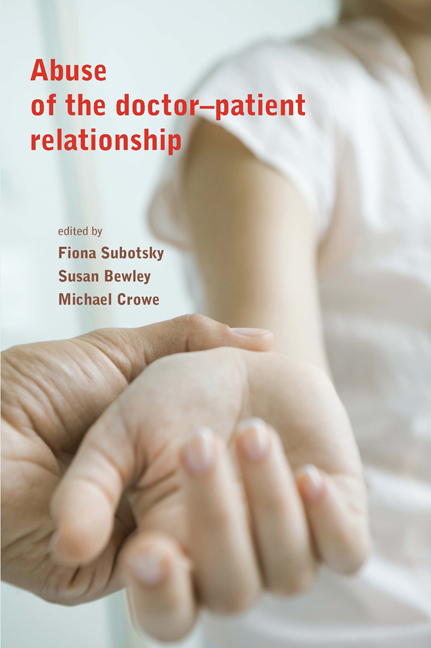Book contents
- Frontmatter
- Contents
- List of figures, tables and boxes
- List of contributors
- Foreword
- Introduction: mapping the territory
- 1 The ethical importance of boundaries to intimacy
- 2 The patient's perspective: impact and treatment
- 3 Teaching ethics and ethical behaviour to medical students
- 4 With the benefit of hindsight: lessons from history
- 5 The prevalence of boundary violations between mental health professionals and their clients
- 6 Psychiatry: responding to the Kerr/Haslam Inquiry
- 7 The general practitioner and abuse in primary care
- 8 Boundaries and boundary violations in psychotherapy
- 9 Sexual therapies: ethical guidelines, vulnerabilities and boundaries
- 10 Obstetrics and gynaecology: a special case?
- 11 Nurses as abusers: a career perspective
- 12 Medical management: governance and sexual boundary issues
- 13 Dealing with offending doctors: sanctions and remediation
- 14 Defending doctors: the protection society's experience
- 15 Regulation and its capacity to minimise abuse by professionals
- 16 The role of the General Medical Council
- Appendix 1 Extract from Vulnerable Patients, Safe Doctors
- Appendix 2 Codes of ethics of psychiatric associations in other countries
- Appendix 3 Guidance from the Council for Healthcare Regulatory Excellence
- Appendix 4 Examples of determinations by the General Medical Council's Fitness to Practise panels
- Appendix 5 Website resources and information
- Index
Appendix 2 - Codes of ethics of psychiatric associations in other countries
- Frontmatter
- Contents
- List of figures, tables and boxes
- List of contributors
- Foreword
- Introduction: mapping the territory
- 1 The ethical importance of boundaries to intimacy
- 2 The patient's perspective: impact and treatment
- 3 Teaching ethics and ethical behaviour to medical students
- 4 With the benefit of hindsight: lessons from history
- 5 The prevalence of boundary violations between mental health professionals and their clients
- 6 Psychiatry: responding to the Kerr/Haslam Inquiry
- 7 The general practitioner and abuse in primary care
- 8 Boundaries and boundary violations in psychotherapy
- 9 Sexual therapies: ethical guidelines, vulnerabilities and boundaries
- 10 Obstetrics and gynaecology: a special case?
- 11 Nurses as abusers: a career perspective
- 12 Medical management: governance and sexual boundary issues
- 13 Dealing with offending doctors: sanctions and remediation
- 14 Defending doctors: the protection society's experience
- 15 Regulation and its capacity to minimise abuse by professionals
- 16 The role of the General Medical Council
- Appendix 1 Extract from Vulnerable Patients, Safe Doctors
- Appendix 2 Codes of ethics of psychiatric associations in other countries
- Appendix 3 Guidance from the Council for Healthcare Regulatory Excellence
- Appendix 4 Examples of determinations by the General Medical Council's Fitness to Practise panels
- Appendix 5 Website resources and information
- Index
Summary
Canadian Psychiatric Association: position statement on sexual misconduct
The four points quoted below comprise the position statement submitted by the Professional Standards and Practice Council to the Board of Directors of the Canadian Psychiatric Association and was approved in 1995, when it replaced 1985 statement (online at http://publications.cpa-apc.org/media. php?mid=188&xwm=true).
• The Canadian Psychiatric Association deems sexual activity of any kind between a psychiatrist and his or her patient to be sexual misconduct and unacceptable in any circumstances.
• The Canadian Psychiatric Association deems any form of sexualisation by the psychiatrist of the psychiatrist–patient relationship to be unethical.
• The Canadian Psychiatric Association presumes sexual relationships with former patients to be unethical.
• Any member of the Canadian Psychiatric Association losing a medical licence as a result of sexual misconduct will have his or her membership in the Association revoked.
American Psychiatric Association: ‘Principles of medical ethics’
The four points quoted below are taken from ‘Principles of medical ethics, with annotations especially applicable to psychiatry’, published by the American Psychiatric Association in November 2003 as an amended edition of a document first published in 2001:
• The requirement that the physician conduct himself/herself with propriety in his or her profession and in all the actions of his or her life is especially important in the case of the psychiatrist because the patient tends to model his or her behavior after that of his or her psychiatrist by identification.
• Further, the necessary intensity of the treatment relationship •• may tend to activate sexual and other needs and fantasies on the part of both patient and psychiatrist, while weakening the objectivity necessary for control.
• Additionally, the inherent inequality in the doctor–patient relationship may lead to exploitation of the patient.
• Sexual activity with a current or former patient is unethical.
- Type
- Chapter
- Information
- Abuse of the Doctor-Patient Relationship , pp. 206 - 207Publisher: Royal College of PsychiatristsFirst published in: 2017

